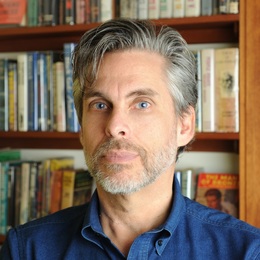During a 30-minute phone conversation, Chabon covered a lot of ground far beyond stories of his family and its ties to Philadelphia—namely, his gift for bringing characters to life on the page, the evolution of his approach to telling vivid stories and his marriage to another successful writer, Ayelet Waldman.
“Moonglow” was inspired, in part, by deathbed conversations with your real-life grandfather. In writing this book, did reflecting on your grandfather’s stories change your opinion of him?
My opinion of my grandfather didn’t change at all. My grandfather—my mother’s actual father—is a very different person than the fictional grandfather in this book. The little bits and pieces of my real-life grandfather really are just that: little bits and pieces. I also pulled things from other male relatives from the other side [of my family]. The grandfather character is an amalgam of a lot of different men of that generation in my family, but more than that there’s a lot of myself in the character, too. So to answer your question: My understanding of my grandfather didn’t change at all. Maybe my understanding of myself changed. It was a self-portrait in many ways.
Pennsylvania, including Philadelphia, shows up quite frequently in your books. “Moonglow” is certainly no exception. Beyond your college years in Pittsburgh and your family’s roots in South Philadelphia, do you have specific ties to this neck of the woods?
My family was concentrated in the Northeast—we had a New York component, a Pennsylvania component and a Maryland-Virginia component—all spread out. My actual mother’s mother, she grew up [in Philadelphia], so it became a source of inspiration for me. My Uncle Stanley was a big inspiration for this book, too. I started thinking about this man’s life, and I turned to the short 10 or 15 pages about my Uncle Stanley, my mother’s maternal uncle, who had dictated these reminiscences to his daughter before his death—of growing up in Philly, of his childish pleasures and delights—and he had been very specific and detailed. He was probably my favorite of all my relatives of that generation, certainly one of my favorites. I loved reading [his reminiscences] from back then. A lot of my inspiration [for “Moonglow”] came from re-reading them.
I’ve heard stories about your legendary rewrites and late nights at the computer. How much does one of your books change from the first draft to the final draft that’s ready for publication?
So much, completely—that’s what it’s all about: Writing is rewriting. First drafts are necessary; they are obligatory, because you can’t go anywhere without them, but there are no virtues to them apart from getting to the next draft. The first draft is a very exploratory process, where I feel my way around and don’t plan a whole lot before I start. I have an overall sense of what is going to happen based on a very early burst of insight—this is going to go here, this is going to go here, this person is going to fall in love with this person—and all these things are pulled into my mind … but if I plan them out too much, I feel I lose interest in them.
The first draft is important for me; it’s where I make all my mistakes, where I find out what the book is about. The second draft is about refining and focusing, the third draft is trying to fix things that are still broken, the fourth draft is pulling it all together so I can get rid of extraneous elements, and the fifth draft is looking at it from the point of view of: “Is this what the story wants to be about?”
How do the stories you want to tell now differ from the stories you wanted to tell, say, 10 or 20 years ago?
The longer I’ve written, the greater freedom I have felt to tell whatever story I want to tell. To some degree that has meant I get to tell the story I always thought I would tell. From when I was a wee little boy at 11, when I announced I wanted to be a writer, to now, the stories I’m telling haven’t changed at all. In other ways they have changed completely. I have a greater sense of freedom in myself, and I can confide more trust in myself to do whatever it is I think I need to do, so there’s a sense of liberation that comes with that. OK, that went OK, so now maybe I can try this. I also think I’ve gotten to the point where the scope of things I’m writing has expanded.
You’re married to Ayelet Waldman, a fellow author. I’ve heard it can be challenging being married to another writer because they are innately competitive, but I’ve read that’s not the case with you two. Why does it work?
Every once in a while there is a little competitiveness but mostly not. It’s sort of, like, this is the family business: We write. Competitiveness is not an issue, because what’s good for me is good for her and vice versa. … We’re incredibly invested in the other’s books. I’ve read every draft of her new book, and I’ve watched her struggle and wrestle, watching this sometimes tortuous process, and I would go on adventures with her, to research things she needed to research, to meet people she needed to meet. It’s really an inevitable consequence of being involved in each other’s work. I definitely know a lot of [writer] couples who don’t share their work very much, and they work hard to maintain independent careers and tracks and not have their work in a sense become part of their marriage. Being involved [in each other’s work] in some ways makes it a lot harder, because to some degree you feel responsible, but on the plus side there are no boundaries.
Photograph by Benjamin Tice Smith



